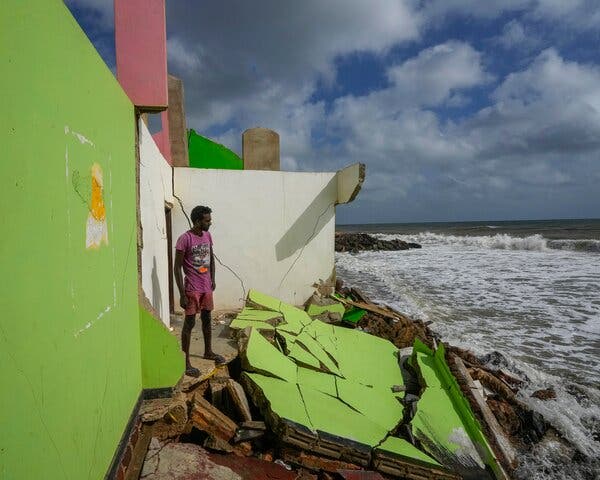Plus the best albums of 2023.

The climate summit approves a fund to aid poor countries
On the first day of the U.N.’s COP28 talks, diplomats from nearly 200 countries approved a draft plan for a fund to help vulnerable countries hit by climate disasters, which are made worse by pollution spewed by wealthy nations.
For more than three decades, developing nations have pressed for compensation from wealthier, more industrialized countries to help with the costs of destructive storms, heat waves and droughts fueled by global warming. The fund has been widely viewed as a positive sign for the two-week summit in Dubai, and is expected to be up and running this year.
Among the nations contributing, the United Arab Emirates and Germany each pledged $100 million, while the U.K. pledged about $76 million and Japan said it would give $10 million. The E.U. climate commissioner said the union would contribute at least around $245 million. The U.S. promised $17.5 million, an amount that some activists criticized as too low for the world’s largest economy.
While the initial pledges add up to about $549 million, climate-related damages are expected to cost developing countries between $280 billion and $580 billion per year by 2030.
Climate disinformation: A new report found that influential nations, including Russia and China, are among the greatest spreaders of false or misleading information about the world’s weather, along with companies that extract fossil fuels and the online provocateurs who make money by sharing claims that global warming is a hoax.
Airlines: To fight global warming, U.S. carriers want to replace jet fuel with ethanol made from corn. But to do so would require further depletion of another precious resource: groundwater.
Kissinger’s complicated legacy
Henry Kissinger, the most powerful secretary of state of the postwar era, died Wednesday at his home in Connecticut at the age of 100. Around the world, his passing elicited sharply divergent opinions: He was both celebrated and reviled.
Kissinger engineered the U.S.’s opening to China, negotiated its exit from Vietnam and remade U.S. power relationships with the Soviet Union, sometimes trampling on democratic values to do so.
Vietnam: In 1973, Kissinger was awarded the Nobel Peace Prize for negotiating the peace accords that ended U.S. involvement in the Vietnam War. But critics accused him of needlessly prolonging the conflict when a framework for peace had been available years earlier.
Cambodia: Kissinger’s decision to authorize the secret carpet bombing of Cambodia in 1969 and 1970 has fueled years of debate about whether the U.S. had committed war crimes.
The Middle East: His role in establishing peace between Israel and Egypt in 1978 shaped the region for decades, and his legacy is reflected in the current war in Gaza.
Covering Kissinger: My colleague David Sanger compared interviewing him to negotiating an arms control agreement: Full of complexity, nuance, evasion and declarations you had to check.
The U.S. tries to guide the war’s next steps
Secretary of State Antony Blinken met with Israeli leaders yesterday to try to extend the fragile cease-fire between Israel and Hamas — which is set to end today — as well as to improve conditions for Gaza’s civilians and to influence what Israel vowed would be the next phase of its military offensive.
Prime Minister Benjamin Netanyahu has reiterated his country’s goal of crushing Hamas, a job that Israel, as well as U.S. officials, says remains far from complete. The new phase of the offensive is expected to focus on southern Gaza, where U.S. and Israeli officials say Hamas’s senior leaders are hunkered down.
The State Department released a statement after the meeting, saying that Blinken had “stressed the imperative of accounting for humanitarian and civilian protection needs in southern Gaza before any military operations there.”
Hostages: Hamas released two more women who were held hostage in Gaza. People who have been freed are recounting stories of violence, hunger and fear, and have returned malnourished, injured and bearing psychological wounds.
Shooting: At least three people were killed and six others wounded when two Hamas-affiliated gunmen opened fire at a bus stop on the outskirts of Jerusalem, Israel said.
THE LATEST NEWS
Sikh assassination plot
-
An indictment by U.S. federal prosecutors describes a chilling plot by an Indian official to arrange the killing of a Sikh American on U.S. soil. Why would India take the risk?
-
The Sikh separatist named as the target of the plot, Gurpatwant Singh Pannun, said in an interview that he was not surprised that India wanted him dead.
-
The scheme as described by prosecutors could upset a key element of President Biden’s foreign policy agenda: bolstering ties with India.
Around the World
-
E.U. inflation fell to a two-year low in November, dropping much faster than expected as a result of high interest rates and efforts by countries to ease prices for energy and food.
-
Russia’s Supreme Court declared the international gay rights movement an “extremist organization.”
Other Big Stories
-
The number of malaria cases rose again in 2022, propelled by flooding and warmer weather in areas once free of the illness, the W.H.O. said. The disease remains a top killer of children.
-
A book publishing “mistake” reignited a furor by naming the British royals who were said to have asked about the skin color of Prince Harry and Meghan’s baby.
-
Elon Musk snapped back at advertisers who had shunned the platform X and spoke about A.I., antisemitism and war in the Middle East at our DealBook Summit. Here are the highlights.
A Morning Read
For his column, Style Outside, which explores street fashion around the world, our photographer Simbarashe Cha was recently in Tokyo, where the signs of fall were everywhere. At Yoyogi Park, lots of people were wearing earth tones that evoked the park’s natural palette. And in Harajuku, a district known for bright colors, Simbarashe was surprised to see many outfits that incorporated black.
Lives lived: Shane MacGowan, the Pogues’ brilliant but chaotic songwriter and frontman who revived interest in Irish music by harnessing it to punk rock, died yesterday at 65.
ARTS AND IDEAS
The best albums of 2023
It was a year of personal reflections rather than grand statements. It was a year when albums from all over the world expanded the idea of what pop music could be. And it was a smart, stupid and fully alive year in which music offered a much-needed escape.
Our critics Jon Pareles, Jon Caramanica and Lindsay Zoladz took stock of the albums that they felt had the greatest impact over the past year.
“For me, there was no overwhelming, year-defining album; this list could just as well be alphabetical,” Jon Pareles writes. Take a look at the full list.
RECOMMENDATIONS
Cook: Fruity citrus joins spicy radishes in this ginger-dill salmon.
Watch: In “May December,” Todd Haynes’s sly, unnerving film, nothing is as it first seems.
Shop: Wirecutter has the 26 best gift ideas for teenagers.
Travel: Spend 36 hours discovering Melbourne, Australia’s biggest city.
Play Spelling Bee, the Mini Crossword, Wordle and Sudoku. Find all our games here.
That’s it for today’s briefing. See you Monday. — Justin
We welcome your feedback. Send us your suggestions at briefing@nytimes.com.
This post was originally published on this site be sure to check out more of their content.








